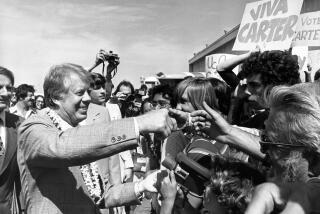Henry Cabot Lodge Jr., Ex-Senator, Dies at 82 : Was Ambassador to South Vietnam and to United Nations
Henry Cabot Lodge Jr., a descendant of one of America’s oldest and most distinguished families who served his nation as a senator and as ambassador to the United Nations and to South Vietnam during the early years of American involvement there, died Wednesday. He was 82.
The quintessential Boston aristocrat and Republican who found his political career overshadowed by that of a fellow Bostonian, Democrat John F. Kennedy, died at his home in the Boston suburb of Beverly after a long illness, his family announced. His son George Lodge said that Lodge had suffered from congestive heart failure.
Lodge first came to national attention in 1952, when he helped persuade Dwight D. Eisenhower to run for the Republican nomination for the presidency. Lodge managed the campaign in which Eisenhower won the nomination from Ohio’s conservative Sen. Robert A. Taft.
He served Eisenhower in the U.N. post and, although there were those in the Eisenhower Administration who preferred the cultured New Englander to Vice President Richard M. Nixon, it was Nixon who got Eisenhower’s somewhat half-hearted endorsement for the presidential nomination in 1960.
The consolation prize for Lodge was the vice presidential nomination, but the Nixon-Lodge slate lost--by 113,000 votes out of 68 million cast--to Kennedy and his Texas running mate, Lyndon B. Johnson.
It wasn’t long before Kennedy, needing an ambassador to South Vietnam and seeking to build bipartisan support, called on his longtime political opponent from Massachusetts. Lodge arrived in Saigon in August, 1963, to take up the increasingly difficult challenge of controlling the excesses of the U.S.-backed regime of Ngo Dinh Diem.
Supported a Coup
Acting on instructions from Washington, Lodge quietly supported a coup that killed Diem and opened the way to a succession of military leaders that the United States found more pliable.
Lodge, born on July 5, 1902, in Nahant, Mass., was only 7 when his father died and his upbringing was taken over by his grandfather, the U.S. senator whose name he bore.
After being graduated cum laude from Harvard, Lodge worked for a time as a newspaperman before entering politics as a state legislator. He served two terms, then, at the age of 34, fought and defeated the master Democratic politician, Gov. James M. Curley, in a race for the U.S. Senate.
He was the seventh Lodge to serve in the Senate.
Fought in WWII
He resigned from the Senate to fight in World War II, serving in Europe as a lieutenant colonel in the Army.
He was reelected twice to the Senate but, in 1952, Kennedy, a young U.S. representative, upset him when he ran for reelection.
Wednesday, Kennedy’s brother, Sen. Edward M. Kennedy (D-Mass.), called Lodge “one of the greatest statesmen,” and the White House released a statement calling him “a very distinguished American.”
At the U.N., Lodge was a strong spokesman of anti-communism, often accusing the Soviets of lies and brutality.
He became something of a daytime television hero with his forceful denunciations of Soviet transgressions during the U-2 and Congo crises of the late 1950s.
But Lodge was capable of quiet negotiations with the Soviets--he succeeded in hammering out agreements on the peaceful uses of space, the admission of new U.N. members and a cease-fire during the Suez Canal crisis of 1956.
Returned to Politics
Lodge returned to national politics in 1964, coming home from Vietnam after a write-in campaign by his backers gave him a victory in the New Hampshire Republican presidential primary over Nelson A. Rockefeller and Barry Goldwater. When his campaign faltered, Lodge threw his support behind moderate Pennsylvania Gov. William W. Scranton in a vain effort to stop the snowballing campaign of the conservative Goldwater.
In 1965, Johnson, who had defeated Goldwater for the White House, called on Lodge to return to Saigon as ambassador; he did so, serving for two years.
When Lodge left Vietnam after his first tour, there were 10,000 American troops there. After his second tour, there were 438,000. Lodge was convinced that they would ultimately succeed.
Envoy to W. Germany
In 1969, after a seven-month stint as ambassador to West Germany, Lodge was named by then-President Nixon to head the U.S. delegation to the Paris peace talks. He resigned the job after 10 months with the talks in deadlock. A year later, he was named by Nixon as envoy to the Vatican.
He retired from public service in 1977, settling in Beverly, the hometown of his wife, Emily Sears Lodge, whom he had married in 1926. They had two sons, George Cabot and Henry Sears Lodge.
More to Read
Get the L.A. Times Politics newsletter
Deeply reported insights into legislation, politics and policy from Sacramento, Washington and beyond. In your inbox three times per week.
You may occasionally receive promotional content from the Los Angeles Times.










